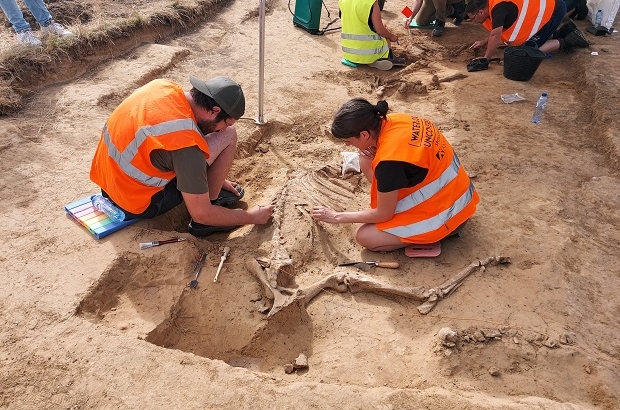- Daily & Weekly newsletters
- Buy & download The Bulletin
- Comment on our articles
Human bones from 1815 Battle of Waterloo unearthed
An international team of archaeologists has discovered human bones and animal skeletons near Mont-Saint-Jean farm in Waterloo, reports RTBF.
These are "extremely rare finds for a Napoleonic battlefield," the Waterloo Uncovered experts said on Wednesday at a presentation of the excavation site to the press.
During the history-changing Battle of Waterloo in 1815, the Mont-Saint-Jean farm served as the main field hospital for Allied troops, led by the Duke of Wellington. In 2019, the team unearthed the remains of three amputated legs at the site. The project was then interrupted due to the coronavirus crisis.
When excavations resumed this year, a human skeleton and horses or mule bones were discovered. They were found along an orchard adjoining the farm, which has now become La Brasserie de Waterloo.
"It's the reality of war that we see here," said Tony Pollard, a professor at the University of Glasgow and one of the project's archaeological directors. "The management of the wounded in this battle, which numbered more than 10,000, was a huge challenge. There were no real funeral rites or marks of respect. The unearthed grave makes it possible to understand that the bodies were simply laid out here,” he added.
"Archaeology provides material evidence. It makes it possible to objectify or revisit the data that historians have been able to compile," said Dominique Bosquet, archaeologist at the Walloon Heritage Agency (Awap).
In 2015, Awap began a collaborative project with the Waterloo Uncovered team, bringing together archaeologists, students, soldiers and veterans. The association uses the digs as a tool to help soldiers recover from the trauma of war.
"It makes it possible to begin a return to civilian life," added Bosquet. Some 20 veterans took part in the excavation project last week, which is now an annual two-week initiative.
Anthony Martin, head of La Brasserie de Waterloo, has been working with Waterloo Uncovered since 2016. All of the finds will enrich the collection of the medical museum that the entrepreneur has set up in one of the wings of the Walloon Brabant farmhouse.
In addition to the digs at Mont-Saint-Jean, excavations were carried out this year at nearby Plancenoit, the site of some of the battle’s bloodiest skirmishes. Around 100 musket balls were among the finds.
















